Management and Organisation: Culture, Holacracy, and Zappos Analysis
VerifiedAdded on 2020/03/07
|8
|1475
|37
Report
AI Summary
This report delves into the concepts of organisational culture and Holacracy, examining their definitions, variations, and impact on organisational structure and management. It explores how organisational culture, as defined by various sources, shapes employee behavior, ethics, and integration within a company. The report then analyzes Holacracy, contrasting it with traditional bureaucratic and team-based structures, and discusses its application to Zappos. Holacracy, as a management approach, supports employee experimentation and decentralization of control. The report also examines contingency factors in organizational design as they relate to Zappos, highlighting how an innovative culture is linked to an agile organisational structure. The conclusion underscores the dynamic nature of organisational culture and the benefits of Holacracy in fostering innovation and employee empowerment, particularly for companies like Zappos.
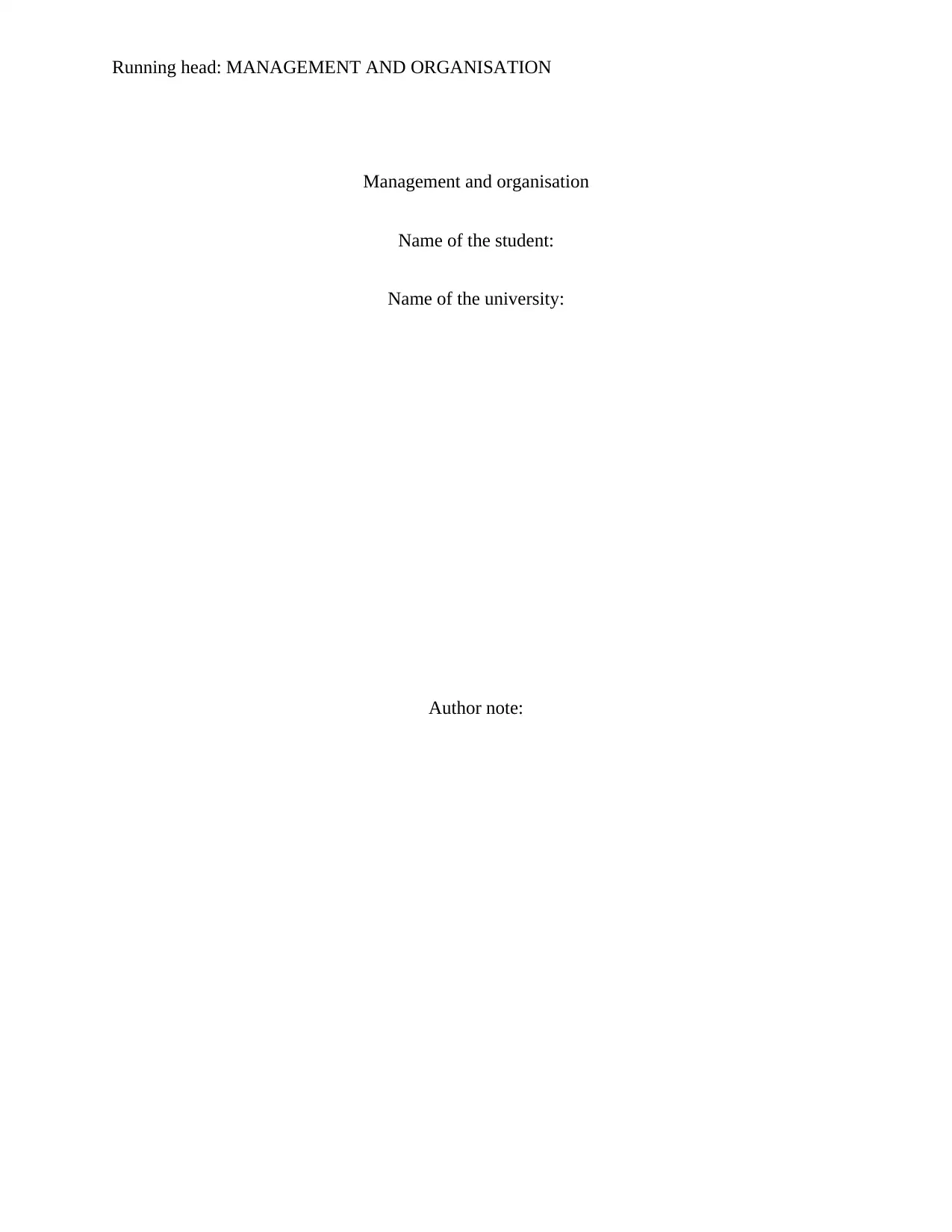
Running head: MANAGEMENT AND ORGANISATION
Management and organisation
Name of the student:
Name of the university:
Author note:
Management and organisation
Name of the student:
Name of the university:
Author note:
Paraphrase This Document
Need a fresh take? Get an instant paraphrase of this document with our AI Paraphraser
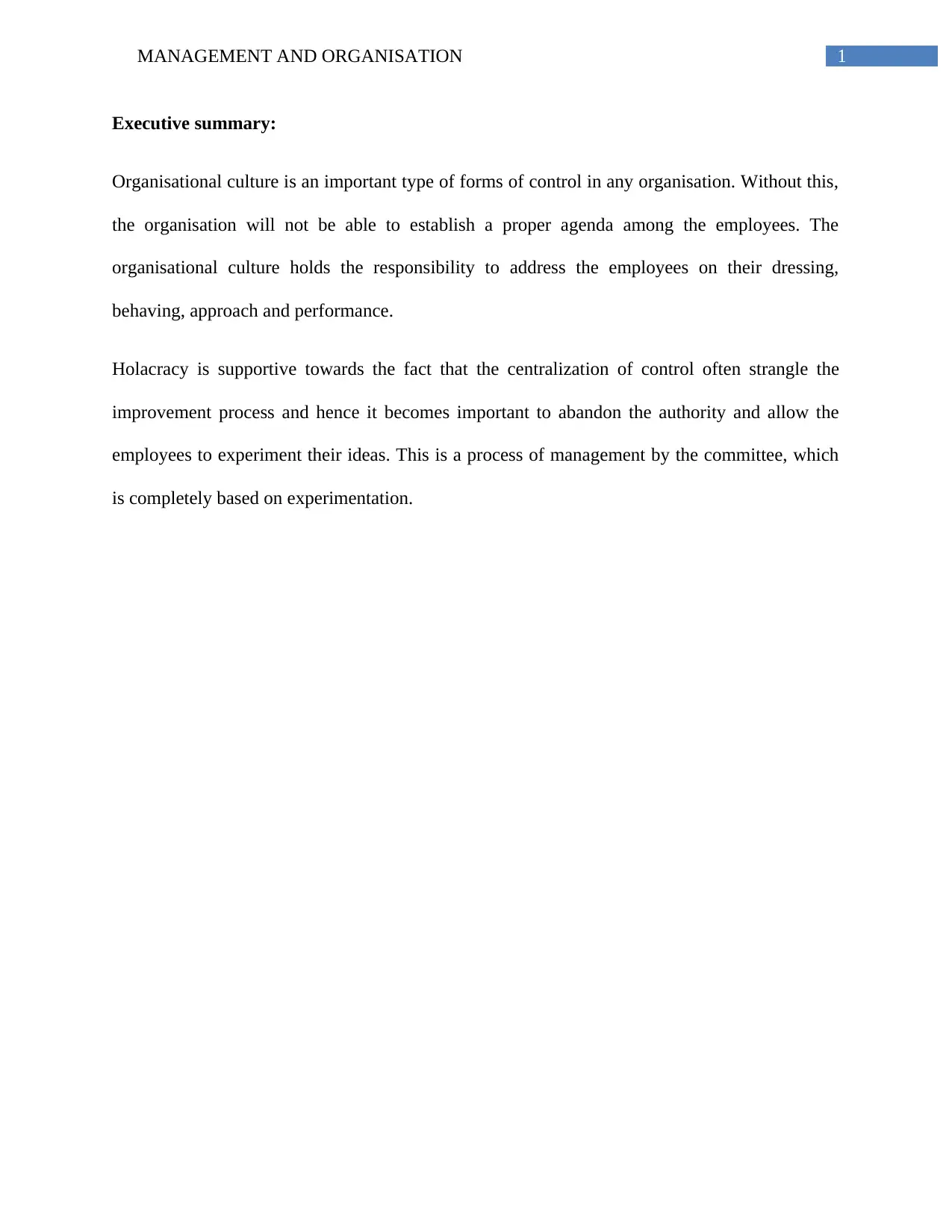
1MANAGEMENT AND ORGANISATION
Executive summary:
Organisational culture is an important type of forms of control in any organisation. Without this,
the organisation will not be able to establish a proper agenda among the employees. The
organisational culture holds the responsibility to address the employees on their dressing,
behaving, approach and performance.
Holacracy is supportive towards the fact that the centralization of control often strangle the
improvement process and hence it becomes important to abandon the authority and allow the
employees to experiment their ideas. This is a process of management by the committee, which
is completely based on experimentation.
Executive summary:
Organisational culture is an important type of forms of control in any organisation. Without this,
the organisation will not be able to establish a proper agenda among the employees. The
organisational culture holds the responsibility to address the employees on their dressing,
behaving, approach and performance.
Holacracy is supportive towards the fact that the centralization of control often strangle the
improvement process and hence it becomes important to abandon the authority and allow the
employees to experiment their ideas. This is a process of management by the committee, which
is completely based on experimentation.
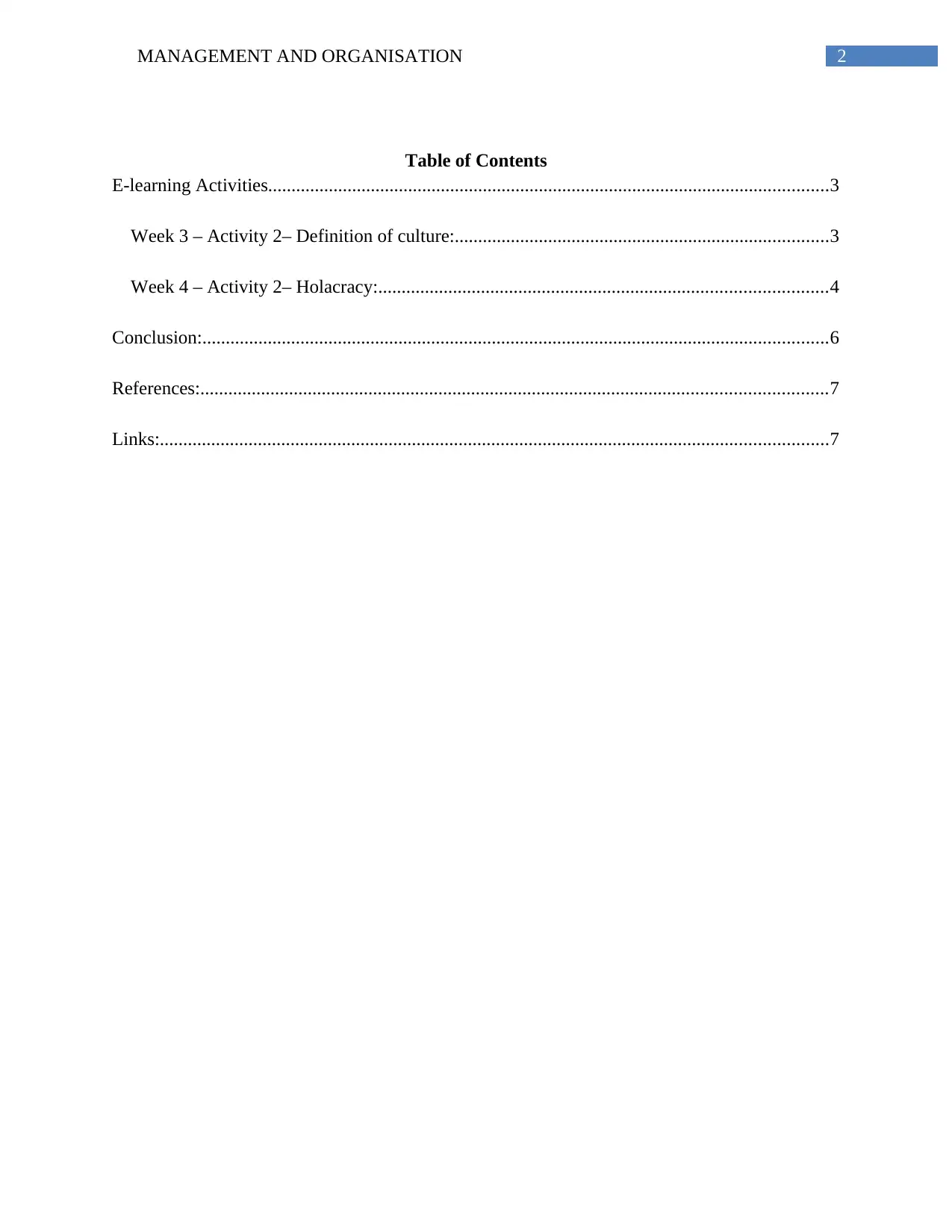
2MANAGEMENT AND ORGANISATION
Table of Contents
E-learning Activities........................................................................................................................3
Week 3 – Activity 2– Definition of culture:................................................................................3
Week 4 – Activity 2– Holacracy:................................................................................................4
Conclusion:......................................................................................................................................6
References:......................................................................................................................................7
Links:...............................................................................................................................................7
Table of Contents
E-learning Activities........................................................................................................................3
Week 3 – Activity 2– Definition of culture:................................................................................3
Week 4 – Activity 2– Holacracy:................................................................................................4
Conclusion:......................................................................................................................................6
References:......................................................................................................................................7
Links:...............................................................................................................................................7
⊘ This is a preview!⊘
Do you want full access?
Subscribe today to unlock all pages.

Trusted by 1+ million students worldwide
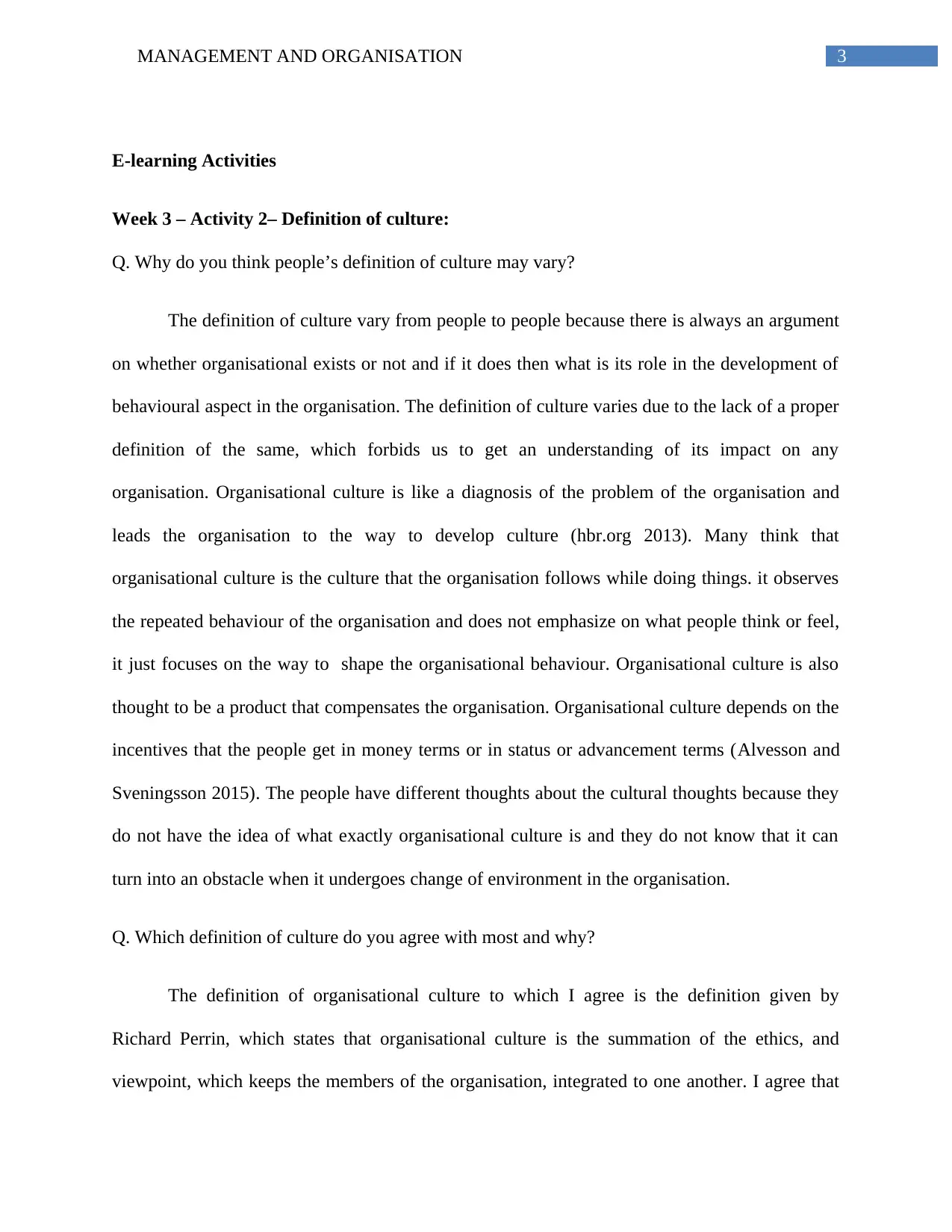
3MANAGEMENT AND ORGANISATION
E-learning Activities
Week 3 – Activity 2– Definition of culture:
Q. Why do you think people’s definition of culture may vary?
The definition of culture vary from people to people because there is always an argument
on whether organisational exists or not and if it does then what is its role in the development of
behavioural aspect in the organisation. The definition of culture varies due to the lack of a proper
definition of the same, which forbids us to get an understanding of its impact on any
organisation. Organisational culture is like a diagnosis of the problem of the organisation and
leads the organisation to the way to develop culture (hbr.org 2013). Many think that
organisational culture is the culture that the organisation follows while doing things. it observes
the repeated behaviour of the organisation and does not emphasize on what people think or feel,
it just focuses on the way to shape the organisational behaviour. Organisational culture is also
thought to be a product that compensates the organisation. Organisational culture depends on the
incentives that the people get in money terms or in status or advancement terms (Alvesson and
Sveningsson 2015). The people have different thoughts about the cultural thoughts because they
do not have the idea of what exactly organisational culture is and they do not know that it can
turn into an obstacle when it undergoes change of environment in the organisation.
Q. Which definition of culture do you agree with most and why?
The definition of organisational culture to which I agree is the definition given by
Richard Perrin, which states that organisational culture is the summation of the ethics, and
viewpoint, which keeps the members of the organisation, integrated to one another. I agree that
E-learning Activities
Week 3 – Activity 2– Definition of culture:
Q. Why do you think people’s definition of culture may vary?
The definition of culture vary from people to people because there is always an argument
on whether organisational exists or not and if it does then what is its role in the development of
behavioural aspect in the organisation. The definition of culture varies due to the lack of a proper
definition of the same, which forbids us to get an understanding of its impact on any
organisation. Organisational culture is like a diagnosis of the problem of the organisation and
leads the organisation to the way to develop culture (hbr.org 2013). Many think that
organisational culture is the culture that the organisation follows while doing things. it observes
the repeated behaviour of the organisation and does not emphasize on what people think or feel,
it just focuses on the way to shape the organisational behaviour. Organisational culture is also
thought to be a product that compensates the organisation. Organisational culture depends on the
incentives that the people get in money terms or in status or advancement terms (Alvesson and
Sveningsson 2015). The people have different thoughts about the cultural thoughts because they
do not have the idea of what exactly organisational culture is and they do not know that it can
turn into an obstacle when it undergoes change of environment in the organisation.
Q. Which definition of culture do you agree with most and why?
The definition of organisational culture to which I agree is the definition given by
Richard Perrin, which states that organisational culture is the summation of the ethics, and
viewpoint, which keeps the members of the organisation, integrated to one another. I agree that
Paraphrase This Document
Need a fresh take? Get an instant paraphrase of this document with our AI Paraphraser
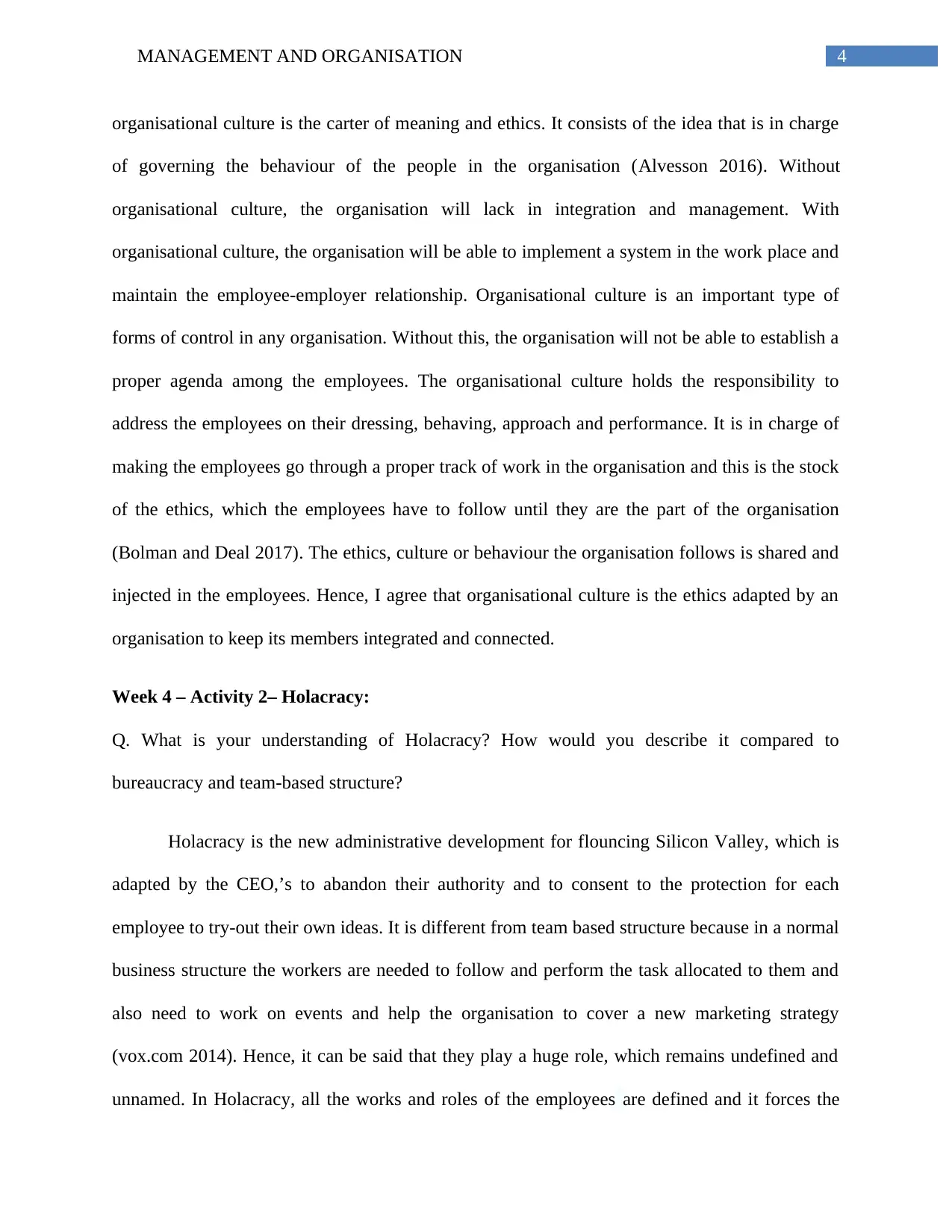
4MANAGEMENT AND ORGANISATION
organisational culture is the carter of meaning and ethics. It consists of the idea that is in charge
of governing the behaviour of the people in the organisation (Alvesson 2016). Without
organisational culture, the organisation will lack in integration and management. With
organisational culture, the organisation will be able to implement a system in the work place and
maintain the employee-employer relationship. Organisational culture is an important type of
forms of control in any organisation. Without this, the organisation will not be able to establish a
proper agenda among the employees. The organisational culture holds the responsibility to
address the employees on their dressing, behaving, approach and performance. It is in charge of
making the employees go through a proper track of work in the organisation and this is the stock
of the ethics, which the employees have to follow until they are the part of the organisation
(Bolman and Deal 2017). The ethics, culture or behaviour the organisation follows is shared and
injected in the employees. Hence, I agree that organisational culture is the ethics adapted by an
organisation to keep its members integrated and connected.
Week 4 – Activity 2– Holacracy:
Q. What is your understanding of Holacracy? How would you describe it compared to
bureaucracy and team-based structure?
Holacracy is the new administrative development for flouncing Silicon Valley, which is
adapted by the CEO,’s to abandon their authority and to consent to the protection for each
employee to try-out their own ideas. It is different from team based structure because in a normal
business structure the workers are needed to follow and perform the task allocated to them and
also need to work on events and help the organisation to cover a new marketing strategy
(vox.com 2014). Hence, it can be said that they play a huge role, which remains undefined and
unnamed. In Holacracy, all the works and roles of the employees are defined and it forces the
organisational culture is the carter of meaning and ethics. It consists of the idea that is in charge
of governing the behaviour of the people in the organisation (Alvesson 2016). Without
organisational culture, the organisation will lack in integration and management. With
organisational culture, the organisation will be able to implement a system in the work place and
maintain the employee-employer relationship. Organisational culture is an important type of
forms of control in any organisation. Without this, the organisation will not be able to establish a
proper agenda among the employees. The organisational culture holds the responsibility to
address the employees on their dressing, behaving, approach and performance. It is in charge of
making the employees go through a proper track of work in the organisation and this is the stock
of the ethics, which the employees have to follow until they are the part of the organisation
(Bolman and Deal 2017). The ethics, culture or behaviour the organisation follows is shared and
injected in the employees. Hence, I agree that organisational culture is the ethics adapted by an
organisation to keep its members integrated and connected.
Week 4 – Activity 2– Holacracy:
Q. What is your understanding of Holacracy? How would you describe it compared to
bureaucracy and team-based structure?
Holacracy is the new administrative development for flouncing Silicon Valley, which is
adapted by the CEO,’s to abandon their authority and to consent to the protection for each
employee to try-out their own ideas. It is different from team based structure because in a normal
business structure the workers are needed to follow and perform the task allocated to them and
also need to work on events and help the organisation to cover a new marketing strategy
(vox.com 2014). Hence, it can be said that they play a huge role, which remains undefined and
unnamed. In Holacracy, all the works and roles of the employees are defined and it forces the
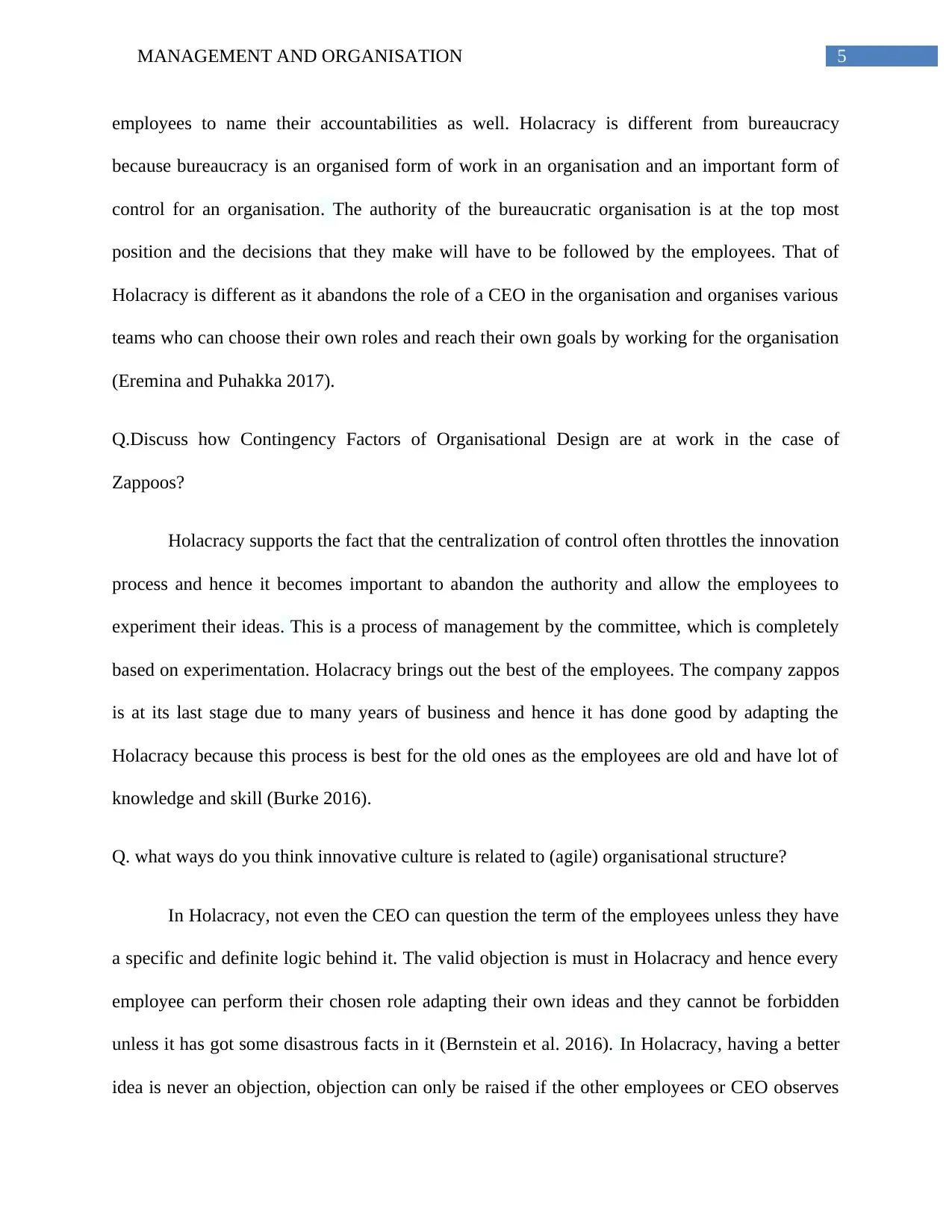
5MANAGEMENT AND ORGANISATION
employees to name their accountabilities as well. Holacracy is different from bureaucracy
because bureaucracy is an organised form of work in an organisation and an important form of
control for an organisation. The authority of the bureaucratic organisation is at the top most
position and the decisions that they make will have to be followed by the employees. That of
Holacracy is different as it abandons the role of a CEO in the organisation and organises various
teams who can choose their own roles and reach their own goals by working for the organisation
(Eremina and Puhakka 2017).
Q.Discuss how Contingency Factors of Organisational Design are at work in the case of
Zappoos?
Holacracy supports the fact that the centralization of control often throttles the innovation
process and hence it becomes important to abandon the authority and allow the employees to
experiment their ideas. This is a process of management by the committee, which is completely
based on experimentation. Holacracy brings out the best of the employees. The company zappos
is at its last stage due to many years of business and hence it has done good by adapting the
Holacracy because this process is best for the old ones as the employees are old and have lot of
knowledge and skill (Burke 2016).
Q. what ways do you think innovative culture is related to (agile) organisational structure?
In Holacracy, not even the CEO can question the term of the employees unless they have
a specific and definite logic behind it. The valid objection is must in Holacracy and hence every
employee can perform their chosen role adapting their own ideas and they cannot be forbidden
unless it has got some disastrous facts in it (Bernstein et al. 2016). In Holacracy, having a better
idea is never an objection, objection can only be raised if the other employees or CEO observes
employees to name their accountabilities as well. Holacracy is different from bureaucracy
because bureaucracy is an organised form of work in an organisation and an important form of
control for an organisation. The authority of the bureaucratic organisation is at the top most
position and the decisions that they make will have to be followed by the employees. That of
Holacracy is different as it abandons the role of a CEO in the organisation and organises various
teams who can choose their own roles and reach their own goals by working for the organisation
(Eremina and Puhakka 2017).
Q.Discuss how Contingency Factors of Organisational Design are at work in the case of
Zappoos?
Holacracy supports the fact that the centralization of control often throttles the innovation
process and hence it becomes important to abandon the authority and allow the employees to
experiment their ideas. This is a process of management by the committee, which is completely
based on experimentation. Holacracy brings out the best of the employees. The company zappos
is at its last stage due to many years of business and hence it has done good by adapting the
Holacracy because this process is best for the old ones as the employees are old and have lot of
knowledge and skill (Burke 2016).
Q. what ways do you think innovative culture is related to (agile) organisational structure?
In Holacracy, not even the CEO can question the term of the employees unless they have
a specific and definite logic behind it. The valid objection is must in Holacracy and hence every
employee can perform their chosen role adapting their own ideas and they cannot be forbidden
unless it has got some disastrous facts in it (Bernstein et al. 2016). In Holacracy, having a better
idea is never an objection, objection can only be raised if the other employees or CEO observes
⊘ This is a preview!⊘
Do you want full access?
Subscribe today to unlock all pages.

Trusted by 1+ million students worldwide
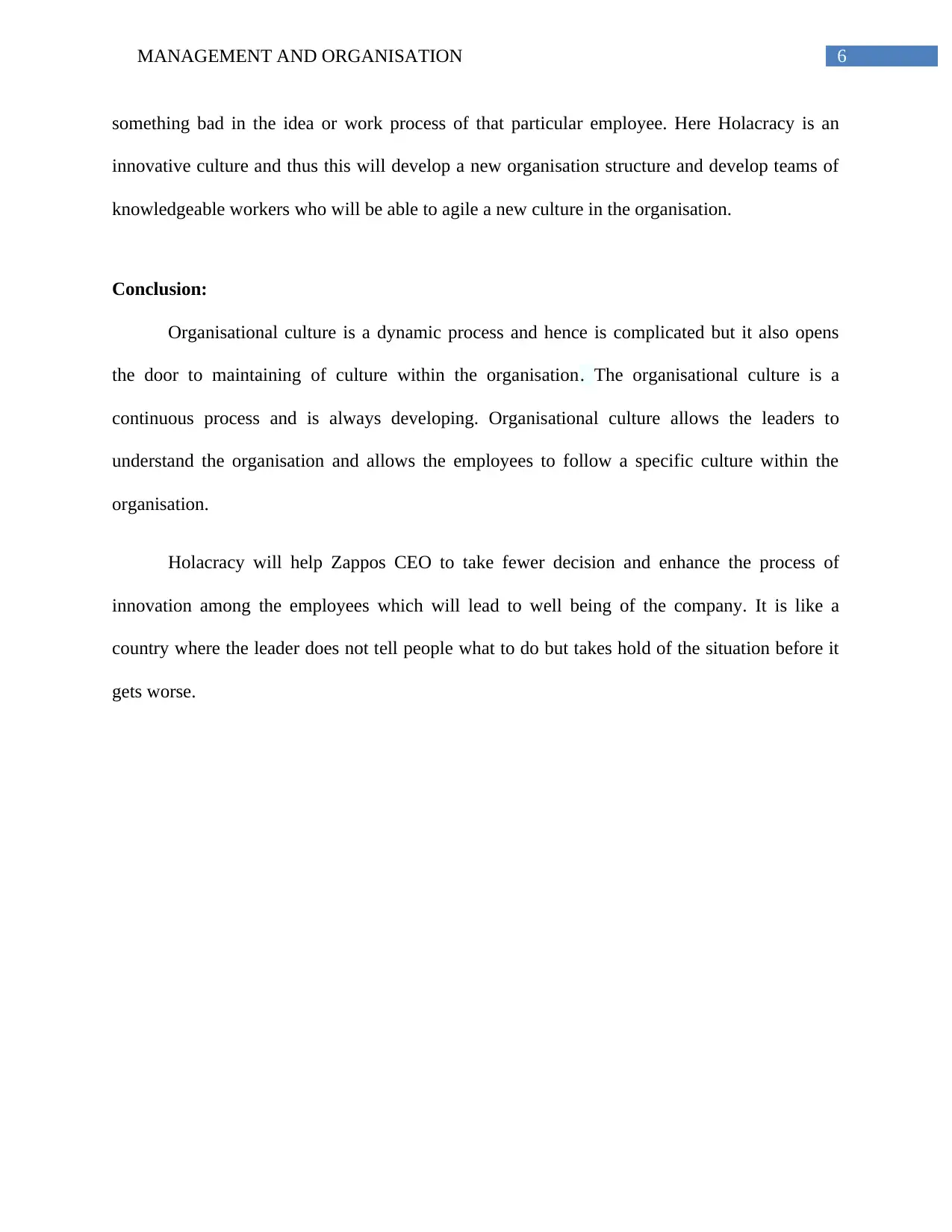
6MANAGEMENT AND ORGANISATION
something bad in the idea or work process of that particular employee. Here Holacracy is an
innovative culture and thus this will develop a new organisation structure and develop teams of
knowledgeable workers who will be able to agile a new culture in the organisation.
Conclusion:
Organisational culture is a dynamic process and hence is complicated but it also opens
the door to maintaining of culture within the organisation. The organisational culture is a
continuous process and is always developing. Organisational culture allows the leaders to
understand the organisation and allows the employees to follow a specific culture within the
organisation.
Holacracy will help Zappos CEO to take fewer decision and enhance the process of
innovation among the employees which will lead to well being of the company. It is like a
country where the leader does not tell people what to do but takes hold of the situation before it
gets worse.
something bad in the idea or work process of that particular employee. Here Holacracy is an
innovative culture and thus this will develop a new organisation structure and develop teams of
knowledgeable workers who will be able to agile a new culture in the organisation.
Conclusion:
Organisational culture is a dynamic process and hence is complicated but it also opens
the door to maintaining of culture within the organisation. The organisational culture is a
continuous process and is always developing. Organisational culture allows the leaders to
understand the organisation and allows the employees to follow a specific culture within the
organisation.
Holacracy will help Zappos CEO to take fewer decision and enhance the process of
innovation among the employees which will lead to well being of the company. It is like a
country where the leader does not tell people what to do but takes hold of the situation before it
gets worse.
Paraphrase This Document
Need a fresh take? Get an instant paraphrase of this document with our AI Paraphraser
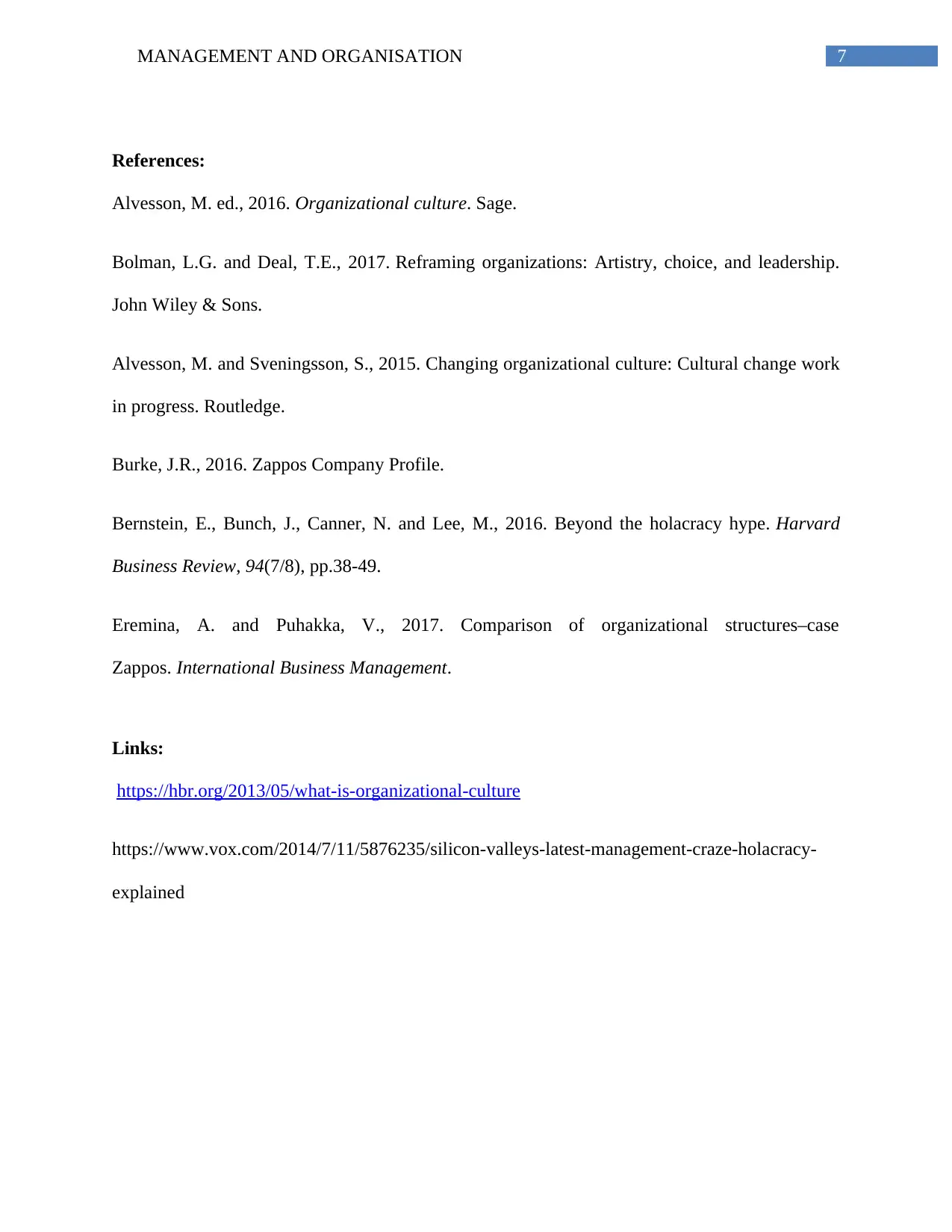
7MANAGEMENT AND ORGANISATION
References:
Alvesson, M. ed., 2016. Organizational culture. Sage.
Bolman, L.G. and Deal, T.E., 2017. Reframing organizations: Artistry, choice, and leadership.
John Wiley & Sons.
Alvesson, M. and Sveningsson, S., 2015. Changing organizational culture: Cultural change work
in progress. Routledge.
Burke, J.R., 2016. Zappos Company Profile.
Bernstein, E., Bunch, J., Canner, N. and Lee, M., 2016. Beyond the holacracy hype. Harvard
Business Review, 94(7/8), pp.38-49.
Eremina, A. and Puhakka, V., 2017. Comparison of organizational structures–case
Zappos. International Business Management.
Links:
https://hbr.org/2013/05/what-is-organizational-culture
https://www.vox.com/2014/7/11/5876235/silicon-valleys-latest-management-craze-holacracy-
explained
References:
Alvesson, M. ed., 2016. Organizational culture. Sage.
Bolman, L.G. and Deal, T.E., 2017. Reframing organizations: Artistry, choice, and leadership.
John Wiley & Sons.
Alvesson, M. and Sveningsson, S., 2015. Changing organizational culture: Cultural change work
in progress. Routledge.
Burke, J.R., 2016. Zappos Company Profile.
Bernstein, E., Bunch, J., Canner, N. and Lee, M., 2016. Beyond the holacracy hype. Harvard
Business Review, 94(7/8), pp.38-49.
Eremina, A. and Puhakka, V., 2017. Comparison of organizational structures–case
Zappos. International Business Management.
Links:
https://hbr.org/2013/05/what-is-organizational-culture
https://www.vox.com/2014/7/11/5876235/silicon-valleys-latest-management-craze-holacracy-
explained
1 out of 8
Related Documents
Your All-in-One AI-Powered Toolkit for Academic Success.
+13062052269
info@desklib.com
Available 24*7 on WhatsApp / Email
![[object Object]](/_next/static/media/star-bottom.7253800d.svg)
Unlock your academic potential
Copyright © 2020–2026 A2Z Services. All Rights Reserved. Developed and managed by ZUCOL.





